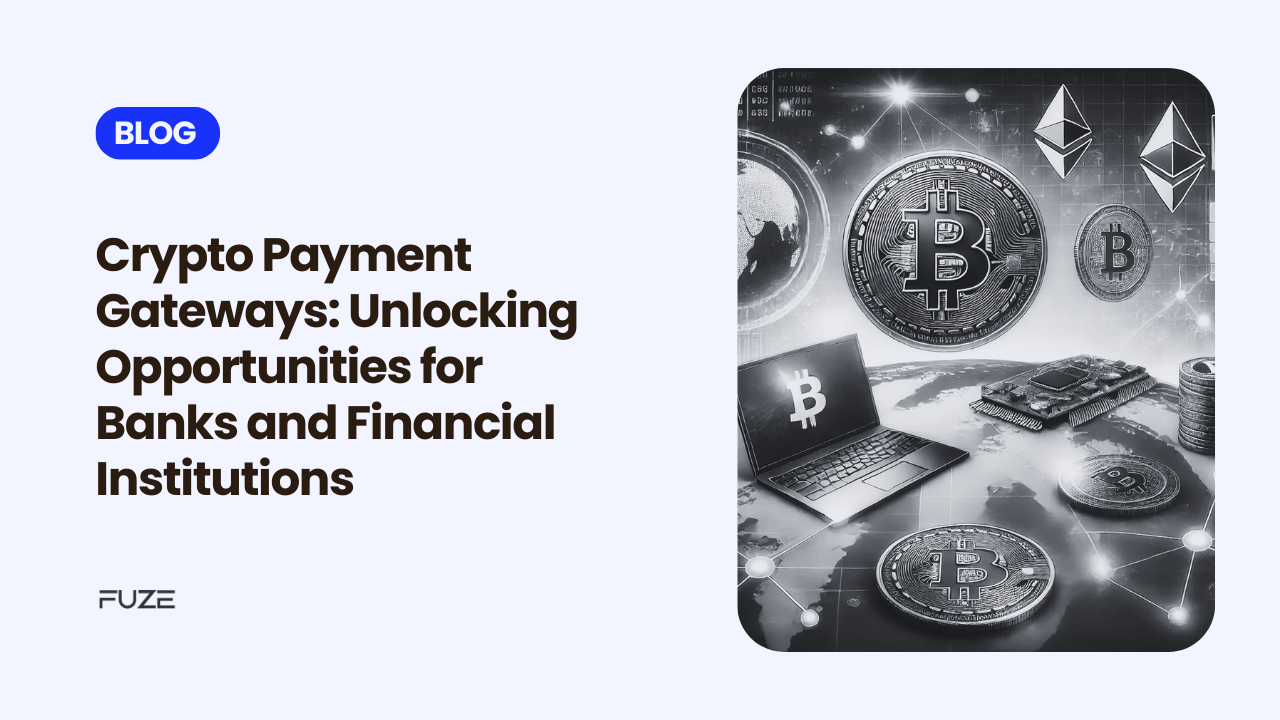The rise of cryptocurrencies has transformed the financial landscape, prompting banks and financial institutions to rethink their approach to digital assets. Crypto payment gateways are emerging as a transformative solution, providing banks and financial institutions with the tools to incorporate cryptocurrency into their offerings. These gateways are not just about facilitating transactions, they offer a seamless integration of digital currencies into existing frameworks while ensuring compliance, security, and scalability.
In this blog, we’ll explore how crypto payment gateways are becoming a critical part of the future for financial institutions, unlocking opportunities while maintaining compliance and trust.
What Are Crypto Payment Gateways?
Think of crypto payment gateways as the infrastructure that allows institutions to process cryptocurrency transactions with the same reliability and ease as traditional payment methods. For banks and financial institutions, these gateways are designed to meet the unique challenges of the sector, such as compliance with regulations, fraud prevention, and scalability.
Here’s what makes them valuable:
- Built-in Compliance Tools: AML and KYC protocols are embedded in these systems to ensure all transactions meet regulatory standards.
- Advanced Security: Advanced encryption and fraud detection tools safeguard every transaction.
- Flexibility: These platforms integrate seamlessly into existing banking systems, making adoption straightforward and efficient.
Why Financial Institutions Need Crypto Payment Gateways
Meeting Evolving Customer Needs
As cryptocurrencies become more mainstream, customers, especially businesses, expect banks to offer services that cater to this demand. By integrating crypto payment gateways, financial institutions can provide solutions that retain current clients and attract new ones.
Cost-Effective International Payments
One of the biggest advantages of cryptocurrency transactions is reduced costs for cross-border payments. By eliminating intermediaries, crypto payment gateways make international transactions faster and cheaper, benefiting both institutions and their customers.
Improved Liquidity Options
Crypto payment gateways allow institutions to tap into global liquidity pools, ensuring smoother settlements and optimizing cash flow.
Better Transparency and Security
The transparency of blockchain technology makes it easy to track and verify transactions, reducing risks associated with fraud and error. This transparency strengthens trust between financial institutions and their customers.
Expanding Revenue Streams
Adding crypto payment options enables financial institutions to diversify their services and revenue. From transaction fees to new digital asset products, these gateways create numerous business opportunities.
How Banks and Institutions Can Use Crypto Payment Gateways
Corporate and Institutional Payments
For large-scale transactions, crypto payment gateways simplify complex processes, offering businesses faster settlements and greater efficiency.
Cross-Border Transactions and Remittances
International payments become seamless with crypto gateways, offering real-time settlements without the high fees associated with traditional systems.
Retail Banking
Banks can introduce crypto-powered payment cards, allowing customers to make purchases globally while earning rewards in cryptocurrency.
Digital Asset Custody
Institutions can also expand into custodial services for digital assets, creating a one-stop solution for their high-net-worth and institutional clients.
Choosing the Right Crypto Payment Gateway
Selecting a gateway isn’t just about finding the most advanced technology. Financial institutions need to consider their specific needs and ensure the solution aligns with regulatory and operational goals.
Here’s what to prioritize:
- Compliance Readiness: Ensure the gateway meets the AML and KYC standards required in your jurisdiction.
- Robust Security: Look for platforms offering multi-layered protection, including cold storage and fraud monitoring.
- Scalability: Choose a solution that can handle growing transaction volumes without compromising performance.
- Integration Ease: Opt for systems with APIs that seamlessly integrate into existing banking platforms.
- Ongoing Support: A reliable gateway provider will offer dedicated customer support and updates to keep operations running smoothly.
Emerging Trends in Crypto Payment Gateways
The future of crypto payment gateways lies in innovation. Here are a few trends shaping their development:
- Stablecoins Leading the Way: Stablecoins are becoming the preferred choice for transactions due to their price stability, making them attractive for businesses and institutions.
- Integration with Tokenized Assets: Combining payment gateways with tokenization enables institutions to offer innovative financial products.
- Focus on Sustainability: Many gateways now support carbon-neutral transactions, aligning with the ESG goals of financial institutions.
Why Banks Should Embrace Crypto Payment Gateways
Incorporating crypto payment solutions isn’t just about keeping up with trends, it’s about securing a place in the future of finance. These systems help institutions improve operational efficiency, expand service offerings, and meet the growing demand for digital assets.
As the financial sector evolves, early adopters of crypto payment gateways will have a competitive edge. Banks and financial institutions can leverage this technology to stay ahead, offering customers modern solutions while maintaining the trust and security they expect.
Conclusion
Crypto payment gateways offer banks and financial institutions an opportunity to bridge the gap between traditional finance and the digital economy. These systems enable seamless crypto transactions, enhance transparency, and open doors to new business models.
For institutions looking to explore this space, Fuze provides a compliance-first approach to integrating crypto payment gateways. With its secure and scalable solutions, Fuze helps financial institutions navigate this new space with confidence, ensuring smooth operations and future-ready services.
Disclaimer: Virtual assets carry significant risks, including high volatility and potential loss of your entire investment. They are not backed by governmental protections, and recourse may be limited in case of loss. Always assess your risk tolerance, fully understand the risks, and seek independent financial advice if needed before investing.
Frequently Asked Questions
-
How do crypto payment gateways benefit financial institutions?
They provide secure and efficient payment processing, access to global markets, and an opportunity to innovate by integrating blockchain-based solutions into their existing systems.
-
Are crypto payment gateways compliant with financial regulations?
Reputable crypto payment gateways ensure compliance with local and international regulations, including KYC (Know Your Customer) and AML (Anti-Money Laundering) standards.
-
How can banks integrate crypto payment gateways into their existing infrastructure?
Banks can partner with regulated crypto service providers offering APIs and tailored solutions that align with the bank’s operational and compliance needs.
-
What challenges might banks face in adopting crypto payment gateways?
Challenges include navigating regulatory uncertainties, ensuring system security, managing volatility risks, and educating staff and customers about the technology.
-
Can crypto payment gateways support multiple cryptocurrencies?
Yes, most modern crypto payment gateways support a variety of cryptocurrencies, providing flexibility and wider adoption opportunities for businesses and customers.







